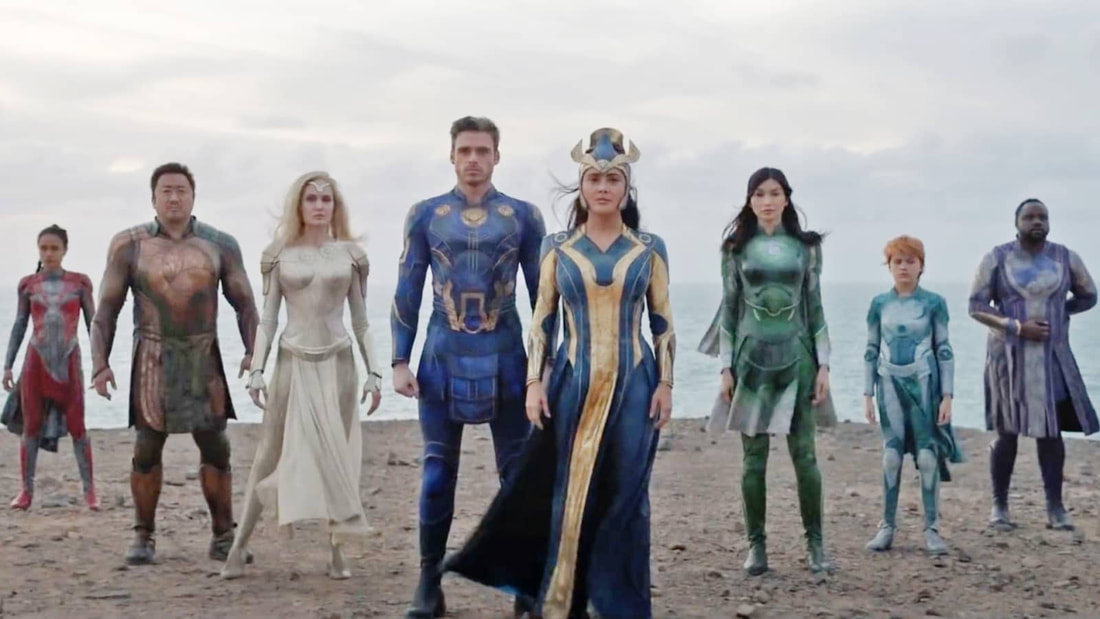The plot, such as it is, also does Eternals no favors. MCU films without a world-ending climax tend to be the better ones, because stakes that high equal no stakes at all in a franchise that will presumably continue long after my death. Spanning millennia, Eternals tracks the team of space gods from the first time they interceded on behalf of humans to the present day, when they’ve been separated following the conquest of the Aztecs. Gemma Chan’s Sersi is living an average life in London alongside perpetual tween Sprite (Lia McHugh) when their ancient enemy, a reptilian Deviant, attacks them. Rescued by Ikaris (Richard Madden), the trio survive and seek advice from their leader Ajak (Salma Hayek), who has secluded herself on a Dakota farmstead. This being from Chloe Zhao, the Dakotas had to be visited. Someone got to Ajak first, however, and the trio finds her dead. Sersi becomes the new leader, and a privilege of leadership is getting to talk with their own god, Arishem, a space giant who tells her that they exist to shepherd intelligent life until there’s so much of it, its collective mass is enough to birth a new space giant, who will in turn bring new worlds into being. Sersi’s conflicted about the erasure of all life on earth, and she, Sprite, and Ikaris travel the globe to assemble the rest of the team in search of a solution.
The newest phase of the MCU has started to hint at where the franchise is going, with greater cosmic stakes and multiple universes. As one of the first films following the mostly earthbound exploits of the first 23 films, Eternals posits that everything that’s happened thus far is at the whim of a space god who could’ve blinked out everything whenever it wanted, except it didn’t want to abort the space god baby gestating in the planet. Meanwhile, Ant-Man and the Wasp is about a robbery and takes place over the course of a day. Balancing grand stakes with local stakes is something worth doing, but these are too grand. On top of the potential end of the planet, the Deviants are still out in the world as well, gumming up the works as a secondary villain whose purpose remains muddy and obstructive til the end. It’s like Zhao and the three (low for Marvel) other screenwriters sensed the problem and patched it with a down-to-earth villain who’s given so little thought that it’s arguably a franchise low in a department that the MCU frequently falls down on.
If the characters accompanying the viewer on this quest were more compelling or had better rapport, the journey might’ve been worth it. This is also not the case. Chan as the lead is a baffling choice, a charisma-less plank who was equally unmemorable in Crazy Rich Asians as an obscenely wealthy woman who demanded sympathy because her husband was insecure around all her money. Angelina Jolie plays Thena, a warrior going through the equivalent of Eternals Alzheimer’s that makes the charismatic movie star alternate between blank stares and confused delirium. Madden is supposed to be the Superman of the team, and while he fits the physical part, he fails as a romantic partner for Chan in a relationship lacking in chemistry. Brian Tyree Henry plays things annoyingly straight and earnest for an actor brimming with versatility. Kumail Nanjiani is having the most fun as an Eternal who’s been moonlighting as a Bollywood star, but his physical transformation from a reedy comedian who loved video games to a bulked up ironbody was done in the service of a character who doesn’t get the MCU beefcake shot and whose power is shooting balls of energy out of finger guns. Barry Keoghan is the only actor of the cast whose past work and eerie energy informs his role here, playing a mystical mind controller/cult leader.
The cast’s chemistry should inform relationships that have existed since the Stone Age in one form or another, but that only serves as another missed opportunity. Like most groups of old friends, conversations devolve into Remember When, but these should be the most compelling versions of it. These Remember Whens span all of history, as opposed to a handful of college years, but like so much of Eternals, the vast scope is played for world-ending portent instead of an interesting or wry take on humanity from these immortal observers. When things return to the present, their conversations frequently take the form of if they’re going to do something instead of how, elongating a film where they’re obviously going to take action to stop the planet where most of the other MCU characters live from being destroyed. Even that debate is shortchanged in the dialogue and the visuals. How much intervention is too much is something that comes up amongst the Eternals, but MCU films are more likely to show full-frontal nudity than they are to contain scenes of actual moral complexity.
Zhao’s work was touted by MCU head Kevin Feige in the lead up to Eternals’ release, such that one would be forgiven if he’d never seen a sunset until Zhao showed him one. Filmed, at least in part, away from the Atlanta parking lots where most of the MCU is put together, Eternals does utilize the vistas and the light photography that Zhao is becoming known for, but those vistas worked in The Rider because of what they meant to the character. The emptiness of the landscape in Nomadland informed the protagonist. In Eternals, a sunset is just a sunset. This represents a low point for a franchise whose age is showing, or maybe it’s just my age that’s showing as I keep taking in these extra-long TV episodes passed off as movies. C-

 RSS Feed
RSS Feed